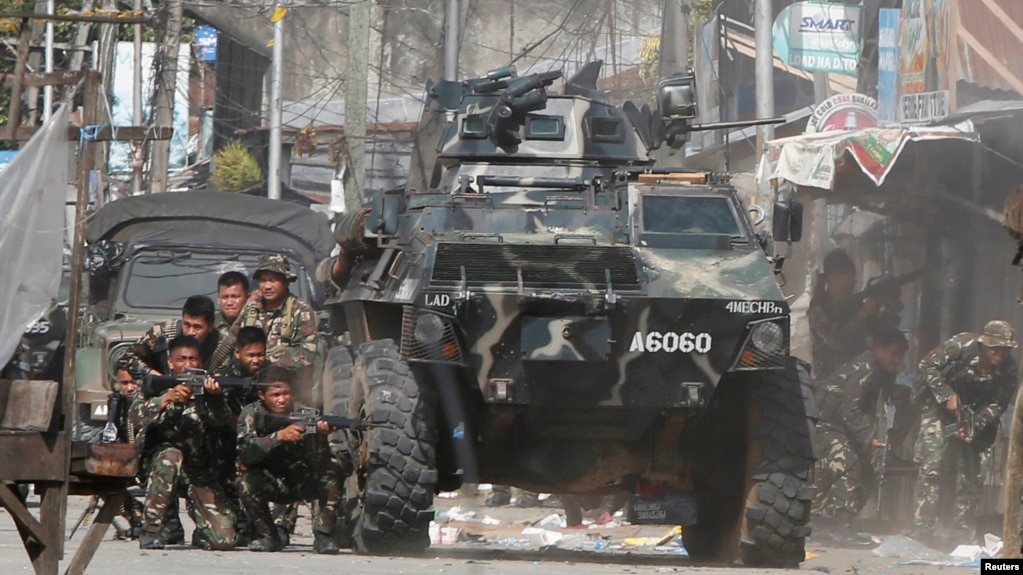
FILE - Government soldiers take cover during a firefight with Muslim rebels from the Moro National Liberation Front (MNLF) in Zamboanga city in southern Philippines September 12, 2013.
The killing of a German tourist in the Philippines is adding urgency to talks between the government of crime-fighting President Rodrigo Duterte and armed Muslim rebel groups with different agendas.
Duterte is trying to talk to the Muslim autonomy-seeking group Moro Islamic Liberation Front (MILF) as well as a separate organization, the Moro National Liberation Front (MNLF), to figure out how they might manage land near the Sulu Sea where Muslims have lived for centuries.
He proposes a federalist government system that could give Muslims a higher degree of power over lands in the archipelago’s southwest.
Beheadings
The killing of 70-year-old German tourist Jurgen Kantner last month at the hands of Abu Sayyaf, a small Muslim group that many Filipinos compare to bandits, raises the urgency for Duterte to draw up a peace and power-sharing plan.
“MILF is no problem. They’ve already committed to the roadmap as agreed upon,” said Ramon Casiple, executive director of the Philippine advocacy group Institute for Political and Electoral Reform. “The problem of course are these other groups, particularly those such as Abu Sayyaf, that are already classified as violent, extremist groups."
Abu Sayyaf also beheaded two Canadian tourists last year and it regularly kidnaps tourists for ransom. Duterte apologized to Germany for his government’s failure to rescue Kantner, and his peace process adviser called for a “stop to this killing of the innocent and the helpless.”
“The pressure is on the government, having failed to protect the German tourist, so that would add I think pressure on the Duterte government entering the peace talks,” said Antonio Montalvan, a newspaper columnist in Cagayan de Oro, a port city near the Muslim region. “It would seem to erode, for example, his credibility in dealing with these terrorist groups.”
Duterte has doubled up efforts to reach peace and power-sharing deals, but his effort faces skepticism from the public, possible dissent in the Philippine congress and complexities within the Muslim rebel groups themselves.
Armed rebels on the southern island Mindanao and the Sulu Sea to its west have stirred up trouble since the 1960s, leaving an estimated 120,000 people dead. The Muslim rebel groups grew out of resentment toward the Catholic Philippine majority and its control over land.
Seventeen years of talks led to a peace deal in 2014 between the government and the Moro Islamic Liberation Front. But Philippine congress members declined to approve an autonomy-sharing deal called the Bangsamoro Basic Law, named after the region of Mindanao that the MILF would help run.
Enthusiasm in congress dropped particularly after a gun battle two years ago with the MILF left 44 special forces troops dead.
The peace process also left out the Muslim National Islamic Front, whose leader Nur Misuari is suspected of staging an attack on the Mindanao hub city Zamboanga, killing 140, in 2013. Both fronts support armed units that, like Abu Sayyaf, have used violence against civilians.
Duterte campaigned on peace deal
Hopes for a new peace effort surged when Duterte took office in June. The Mindanao native had made peace with a communist rebel group in Davao City while mayor there for 22 years. As president he vowed to pursue peace with the Muslim rebels.
Duterte called for starting talks early this year with the Moro Islamic Liberation Front on drafting a new Bangsamoro Basic Law. The two sides have assigned details of the new law to a 21-member commission.
Duterte is expected to fuse any new agreement with his pursuit of federalism, which would give more rights to local governments throughout the developing Southeast Asian country of 102 million people and more than 7,100 islands.
It’s still unclear how federalism would work in a Muslim region, said Miriam Coronel-Ferrer, University of the Philippines political science professor and a peace negotiator under the past president.
“Will it be a symmetrical type of federal arrangement, meaning all states will be the same, or will it take into account the peculiarities of very special places like Bangsamoro?” Colonel-Ferrer asked. “It’s not the case of having an autonomous region in one part of the country. It’s about how to structure the political system and how to share power at the national level.”
The president, known as a tough crime fighter, also met with Misuari, announced peace talks and sought the Moro National Liberation Front’s help in rescuing Abu Sayyaf captives, Misuari’s group says on its website. The group offered that help, the website says.
Duterte signaled in November he might seek talks with Abu Sayyaf as well despite earlier pledges to wipe out the loose-knit 400-strong group militarily. Battles with Abu Sayyaf early in his term killed dozens.
Duterte’s new efforts are still likely to meet headwinds in the Philippine congress, as citizens in much of the country dispute giving land rights to the Muslim groups, analysts say.
Some of those opponents are in Mindanao, a largely impoverished island of 21 million people who resent the Muslim groups' violent rebellions. They may fear that an autonomy deal would threaten the rights of Christians in Mindanao, Montalvan said.
Mindanao’s multiple Muslim rebel groups and the volatility of those in talks with the government could also shatter any new deals, analysts warn. The Moro National Islamic Front says past Philippine presidents have hurt the process through “deceptive” negotiations. Duterte asked the group in January to avoid harboring terrorists.
“The MNLF leadership has expressed high expectations on the Duterte government to prove its worth as a consistent partner,” the official MNLF website says.
http://www.voanews.com/a/philippines-struggles-power-sharing-deal-mulsim-rebels/3754935.html

No comments:
Post a Comment
Note: Only a member of this blog may post a comment.